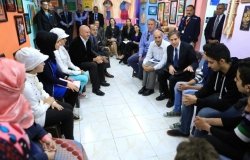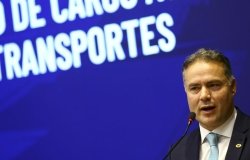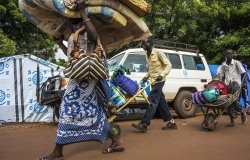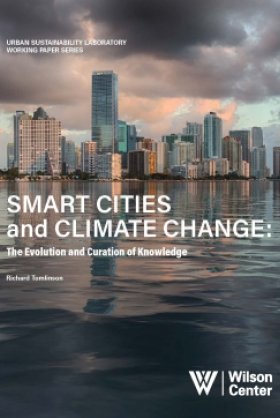Global Urban Poverty: Setting the Research Agenda
Carole Rakodi Professor of International Urban Development, The University of Birmingham;Jorge Wilheim Former Deputy Secretary General of the UN Habitat II Conference (1996).
Overview
On December 15, 2005, the Comparative Urban Studies Project (CUSP) hosted a seminar to discuss the challenges facing policy makers and practitioners working to alleviate poverty in urban areas.
Jorge Wilheim, former Planning Secretary for the city of São Paulo and Deputy Secretary General of the 1996 UN Habitat II Conference, began his talk by giving some introductory comments on poverty production (not reduction). His first comment gave context to mobile societies around the world. In old/new Europe acculturation is happening but it is a stressing dilemma. In Africa the search for a form of proper modernity is changing perspectives towards the problems of urban poverty. In China society is changing with great speed in both rural and urban areas. In large developing countries the migrant culture is proving to be an important aspect to consider in the fight for wealth and against poverty.
Wilheim also pointed out that the world continues to live under the unstable rules of globalization. Neo liberals are asking the state to solve the problems that the market cannot. Globalization has produced the ‘new rich' but also the ‘new poor'. In general, the middle class is getting poorer all around the world. In addition to the concerns of mobile societies and the global economy, Wilheim pointed out the need to define and focus on what sustainable development means especially as it pertains to poverty. Over the years, the definition of sustainable development has changed but sustainability has often been coined as a ‘green' word. The problem is that development has been forgotten about. To sustain development, Wilheim points out that you have to address other pertinent issues in addition to environmental concerns.
Wilheim stressed the need for governments to link long-term structural changes and urgent, short-term strategies to address poverty together. Urgent issues are not the same as fundamental development issues. Urgent is what needs to be done today whereas development issues are invisible but are basic. Responses to urgent issues are valuable only if these strategic actions are linked to the perspective of long-term development goals. Overall Wilheim pointed out the need to think about poverty reduction and ideas to reach an end to poverty, simultaneously.
For the remainder of his presentation Wilheim focused on inclusion policies in São Paulo, Brazil to exemplify the ways in which local governments are able to produce action strategies while thinking of long term solutions to urban poverty. The local government established poverty reduction programs in specific districts within the city, including: 4 income distribution programs, 3 emancipation programs and 2 development programs. With the income distribution program a minimum income was provided for 200,000 families; working scholarships were given to youth under the condition that they attend school; support services and re-education classes were offered to elders who had changed their jobs; and finally temporary jobs were provided to those seeking immediate employment assistance. The emancipation programs provided skills training through computer centers and nurseries. In addition a national micro-credit program was established to help some families start small businesses or investments but it has been only moderately successful due to initial start up difficulties. The development programs helped to create local production chains and small business intermediation.
The results of the inclusion policies in São Paulo were that only 45,000 families were left in the poverty bracket, overall there were fewer homicides and less school evasion, and small local businesses were enhanced. For Wilheim, this experience shows that if you put poverty reduction strategies into the perspective of long-term policy, you are better off than just implementing poverty reduction strategies alone.
In conclusion, his suggestions for a poverty reduction agenda include linking fundamental development issues to strategic poverty reduction strategies with an understanding of the unique regional character of urbanization and poverty. Furthermore we need to study links between the market economy and capitalism. Most importantly we need to think of ways to include the excluded parts of our society in the market and in our lives.
Carole Rakodi, Professor of International Development at the University of Birmingham focused her presentation on the limits to understanding and tackling urban poverty in isolation. Poverty will not be reduced by stand-alone policies. Macroeconomic and social policies need to be considered with their distributional effects from the outset. Geography, space, and social implications need to be taken into consideration. Rural-urban divides are arbitrary. Classification of urban places is arbitrary because space is different in different places. Rakodi stressed the need to consider small urban places and large cities together because small urban centers contribute to the economy of the city. We also need a better knowledge base for urban policy.
Rakodi's presentation identified some key issues for poverty reduction and gaps in the knowledge base of policy and decision makers. She pointed out that policy makers are limited in understanding the extent and nature of urban poverty because of the data that is available. Generally, we have insufficient data to understand diversity and inequality in urban centers. We need more longitudinal studies to define and measure the multiple dimensions of poverty and the impact of interventions. Furthermore the framework on livelihoods and the structure of urban economies needs to be improved to include understanding of different types of households. More importantly, outcomes of past interventions need to be assessed before proceeding further. Rakodi also stressed the importance of understanding the urban economy, as it is critical to poverty reduction.
To understand the types of service provision arrangements delivered to the urban poor Rakodi suggests assessing the roles of the various actors involved including the public, private and non-profit sectors. What services are generating more livelihood opportunities than others?
Rakodi then continued to speak about urban governance and politics. She made the strong point to identify who makes the claims within political structures and to recognize when the poor have rights and political voice. From this, we can understand what and who drives social and economic change in urban areas. When discussing urban land issues for the poor, Rakodi mentioned the need to address the outcomes of attempts at large scale titling and to explore the ways in which titling can become associated with increased access to credit. Related to land titling comes the concern about housing the urban poor. Rakodi stresses the need to understand the impacts of regularization and upgrading on tenants and the outcomes of attempts to develop housing finance systems.
In conclusion Rakodi presents a set of questions to address in order to identify policy issues that are relevant to urban development in developing countries: Who are the poor and why? Why has poverty not been reduced? What don't we know? In order to secure a better future for the urban poor in various parts of the world, research and our understanding of poverty need to be stronger. In order to help the urban poor, we must understand their unique and diverse circumstances.
Hosted By

Urban Sustainability Laboratory
Since 1991, the Urban Sustainability Laboratory has advanced solutions to urban challenges—such as poverty, exclusion, insecurity, and environmental degradation—by promoting evidence-based research to support sustainable, equitable and peaceful cities. Read more
Thank you for your interest in this event. Please send any feedback or questions to our Events staff.









